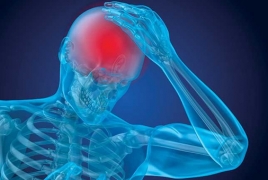Biomarkers in blood may help predict recovery time after concussion July 4, 2019 - 12:49 AMT PanARMENIAN.Net - A study of high school and college football players suggests that biomarkers in the blood may have potential use in identifying which players are more likely to need a longer recovery time after concussion, according to a study published in the July 3, 2019, online issue of Neurology®, the medical journal of the American Academy of Neurology, News medical reports. "With so many people sustaining concussions and a sizeable number of them having prolonged symptoms and recovery, any tools we can develop to help determine who would be at greater risk of problems would be very beneficial, so these results are a crucial first step," says study author Timothy B. Meier, PhD, of the Medical College of Wisconsin in Milwaukee and a member of the American Academy of Neurology The study involved 41 high school and college football players who experienced a concussion during the season. None of the players lost consciousness with their concussions. The players were matched with 43 football players of the same level, age and position who did not have a concussion during that season. All of the participants had blood tests at the beginning of the season. Those who had concussions had blood tests within six hours after the injury, then again 24 to 48 hours later and also eight, 15 and 45 days later. Those who did not have concussions had tests at similar times for comparison. The tests looked at levels of seven biomarkers for inflammation that have been related to more severe brain injury. Of the seven biomarkers, two were elevated for those with concussion at six hours after the injury compared to the athletes with no concussion. The biomarkers interleukin 6 and interleukin 1 receptor antagonist were both elevated at six hours after concussion. For interleukin 6, levels at the beginning of the study were 0.44 picograms per milliliter (pg/mL) for those who later had concussions and 0.40 pg/mL for those who did not have concussions. At six hours after the injury, those with concussions had levels of 1.01 pg/mL, compared to levels of 0.39 at a similar time for those without concussions. "These results demonstrate a meaningful increase in the levels of interleukin 6 for athletes who sustained a concussion compared to athletes who did not," said Meier. Athletes with higher levels of interleukin 6 six hours after the injury were also more likely to take longer to recover from their symptoms. Overall, the athletes with concussions had symptoms for an average of 8.9 days. Eight of the 17 athletes with concussion and high interleukin 6 levels at six hours after injury, compared to their levels at the beginning of the season, still had concussion symptoms eight days after the injury. "Eventually, these results may help us better understand the relationship between injury and inflammation and potentially lead to new treatments," Meier said. Limitations of the study include that the number of athletes with concussion may not be large enough to adequately determine the accuracy of inflammatory markers as biomarkers and that the study included only male high school and college athletes, so the results may not apply to female or youth athletes. Authorities said a total of 192 Azerbaijani troops were killed and 511 were wounded during Azerbaijan’s offensive. In 2023, the Azerbaijani government will increase the country’s defense budget by more than 1.1 billion manats ($650 million). The bill, published on Monday, is designed to "eliminate the shortcomings of an unreasonably broad interpretation of the key concept of "compatriot". The earthquake caused a temporary blackout, damaged many buildings and closed a number of rural roads. Partner news |